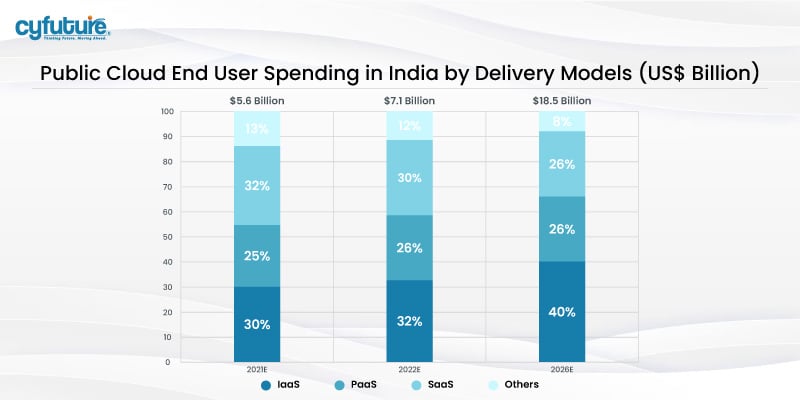-
Get Cloud GPU Server - Register Now!
Toggle navigation

Cloud computing is becoming a disruptive force in the digital space, changing how companies operate, expand, and compete. Along with altering the business environment, India’s digital revolution is having a major impact on the economy.
According to studies done by NASSCOM and Oliver Wyman, cloud computing is expected to contribute 8% of India’s GDP by 2026. By 2026, it can increase the GDP of the nation by $310–$380 billion and create 14 million new jobs.

For Indian businesses of all sorts, from start-ups to large multinational companies, cloud services India have increased productivity, reduced costs, and encouraged innovation. However, to what extent does India’s economic growth benefit from this digital revolution? Cloud service integration with India’s business processes is not just a trend, but a vital component driving the GDP growth of the nation.
According to a report by Oliver Wyman and NASSCOM, India’s public cloud spending would increase at a compound annual growth rate (CAGR) of 27% over the next five years (2022 onwards). This is a result of growing IaaS and PaaS service spending that keeps up with global markets.
Public Cloud End User Spending in India by Delivery Models (US$ Billion)

Indian organizations now operate differently as a result of the move away from antiquated IT paradigms and toward cloud services. Managed cloud hosting and other cloud services in India are helping companies increase productivity, spur greater innovation, and reduce operational costs in India. These changes are having a significant impact on the economy as a whole, as well as the performance of individual businesses.
In this comprehensive blog post, we will explore how cloud services in India are propelling India’s economy and provide insights into how they support increased productivity, the creation of jobs, and the establishment of a more resilient economy.
Let’s look at how cloud services in India go beyond merely being a new technology and how they play a significant role in India’s economic growth.
Cloud services in India provide organizations with many advantages such as cost savings, scalability, flexibility, and disaster recovery. By moving to the cloud, businesses may raise operating costs, ensure business continuity, and reduce capital expenditures on IT equipment purchases. When more resources are available for research and development, GDP rises as a result of its financial efficiency.
Cloud computing is growing quickly in India. The Indian market for public cloud services in India is expected to expand at a compound annual growth rate (CAGR) of 21% from $3.6 billion in 2020 to $9.5 billion in 2025, according to Gartner.
Platform as a Service (PaaS), Software as a Service (SaaS), and Infrastructure as a Service (IaaS) solutions are becoming more and more popular among enterprises of all sizes, which is fueling this growth.
An outside provider is responsible for managing and maintaining cloud infrastructure as part of a service model called managed cloud hosting. Security, upgrades, backups, and server monitoring are some of the responsibilities. Managed cloud hosting lets companies leverage cloud technologies while concentrating on their core skills.

By using cloud services to streamline processes, organizations may improve productivity and efficiency. Businesses may be able to increase communication, automate tedious operations, and make better decisions by utilizing cloud-based tools and applications. This improved productivity leads to more output, which drives GDP growth.
One of the primary benefits of cloud services is the decrease in IT infrastructure costs. Businesses no longer need to incur significant costs for servers, data centers, and upkeep. The company could fund R&D, marketing, and expansion among other things with these cost reductions, which would hasten economic growth.
Many job opportunities have been established in India as a result of the growth of the cloud services sector. Cloud engineers, developers, and sales and marketing experts are among the positions in this category. Growing employment and GDP growth are facilitated by the increased need for skilled labor as more businesses use cloud computing.
Huge foreign investment has been attracted to India’s expanding cloud services industry. Major international IT companies, like Google Cloud, Microsoft Azure, and Amazon Web Services (AWS), have established data centers India, generating thousands of jobs and spending billions of dollars on infrastructure. The country’s GDP is increased by this influx of foreign investment, which also improves its status in the world of technology.
Cloud services in India have made modern technology more accessible to a wider audience, putting startups and small- to medium-sized businesses (SMEs) on an even playing field with larger enterprises. These businesses may now innovate, scale, and enter new markets by utilizing cloud-based tools and services, which will boost the economy and create jobs.
To enhance the delivery of public services, the Indian government has adopted a proactive approach when integrating cloud technology. Cloud technology plays a major role in enabling government initiatives like Digital India and Government e-Marketplace (GeM) to offer citizens accessible, transparent, and efficient services. Better government services contribute to economic expansion and raise the standard of living for locals.
Cloud services in India give businesses a solid platform for innovation by enabling them to test out new concepts and technologies without having to pay hefty upfront costs. This encourages a culture of invention and entrepreneurship, which propels economic expansion and establishes India as a global leader in innovation and technology.
The COVID-19 pandemic has increased demand for digital transformation and remote employment. Cloud services in India made the seamless transition of enterprises to remote workers possible. This move not only ensured business continuity but also showed how important digital infrastructure is to promoting development and resilience in the economy.

Managed cloud hosting makes cloud management easier by delegating to an outside vendor duties such as software upgrades, server monitoring, security fortification, and data backups. Businesses may increase productivity and efficiency by concentrating on their core competencies through delegation.
Managed cloud hosting providers use robust security measures to guarantee adherence to legal and industry requirements. For businesses handling sensitive data, like financial institutions and healthcare providers, this is especially crucial. Enhanced security protocols and adherence to regulations contribute to the maintenance of business continuity, foster trust, and enhance economic stability.
To assist businesses manage their cloud resources more effectively and cut unnecessary costs, managed cloud hosting providers provide affordable options. Firms that exercise meticulous cost control might reallocate resources to other growth-oriented industries, so advancing the economy.
Cloud infrastructure is guaranteed to operate at peak efficiency and reliability with managed cloud hosting. For companies that run online services like e-commerce and other activities that depend on cloud services, this is crucial. Increased customer satisfaction and business growth are the direct results of improved performance and reliability, and this leads to GDP development.
It is anticipated that India’s cloud service demand will continue to soar, driving the state-wide growth of cloud infrastructure. The development of new cloud technologies, the building of more data centers, and higher cloud service investment are all examples of this expansion. The expansion of cloud infrastructure will boost GDP growth, draw in foreign investment, and provide more employment possibilities.
The goal of the Indian government’s Digital India strategy is to make the country a knowledge economy and digitally enabled society. Because they provide the tools and infrastructure needed to enable digital transformation, cloud services are crucial to realizing this ambition.
Cloud computing plays a key role in Industry 4.0, which is the integration of digital technology into manufacturing and industrial processes. Large datasets produced by smart factories and related equipment are simpler to collect, store, and analyze thanks to cloud infrastructure. As the backbone of Industry 4.0, cloud services will stimulate GDP growth, productivity gains, and innovation.
Cloud services are a major factor in the flourishing startup scene in India. Startups across a wide range of industries, such as e-commerce, banking, healthcare, and logistics, employ cloud services to develop and deploy innovative solutions. Because cloud services give enterprises a scalable and affordable platform, they will continue to promote entrepreneurship and stimulate economic growth.
India’s economy is growing because of the huge contribution of cloud services in India, without a doubt. Thanks to increased operational effectiveness, reduced expenses, job creation, and foreign investment, cloud services are significantly boosting India’s GDP. Through its ability to support entrepreneurs, improve government services, foster creativity, facilitate remote work and digital transformation, and encourage innovation, cloud services in India also significantly boost economic growth.
Optimizing cloud administration, enhancing security and compliance, cutting expenses, and enhancing dependability and performance are all made easier with managed cloud hosting. With the expansion of cloud infrastructure, the promotion of Digital India, the backing of Industry 4.0, and the development of a flourishing startup ecosystem, cloud services in India have a bright future as long as India keeps using cloud technology.
To put it briefly, cloud services in India are essential to India’s economic transition and represent more than just a technical breakthrough. India will continue to lead the world in technology and creativity as long as businesses and governments continue to embrace the cloud. This will have a positive effect on GDP growth.
You may lead India’s technological and economic advancements by embracing the cloud revolution with the aid of Cyfuture. Reach out to us right now to see how our state-of-the-art cloud solutions may benefit your business.
Large international IT companies like Google Cloud, Microsoft Azure, and Amazon Web Services have made significant foreign investments in India’s growing cloud services industry. These companies are constructing data centers in India, putting billions of dollars into infrastructure, creating thousands of jobs, increasing GDP, and enhancing the nation’s standing in the global technology arena.
Cloud services in India enable startups and small and medium-sized enterprises to have access to contemporary technology that was previously unaffordable due to high costs. With scalable and affordable solutions, cloud services in India enable smaller businesses to innovate, grow quickly, and compete with larger enterprises. Job possibilities and economic prosperity are produced by this support of entrepreneurship.
With the COVID-19 pandemic in particular, cloud services in India have been essential in helping businesses adjust to digital operations and remote workers. With this shift, business continuity has been ensured, the importance of digital infrastructure has been highlighted, and economic development and resilience have increased.
Entrusting an outside vendor to oversee and care for a business’s cloud infrastructure is known as managed cloud hosting. This includes backups, server monitoring, security, and updates. Using managed cloud hosting lets businesses focus on their core competencies while taking advantage of the cost-savings, increased performance, and increased efficiency that come with cloud computing.
Establishing a plan and investigating cloud choices that align with goals are the first steps for businesses interested in implementing cloud services in India. Businesses can ensure that the benefits of development and innovation are achieved by partnering with reliable cloud service providers like Cyfuture, who can help enterprises integrate cloud technology effectively and efficiently.